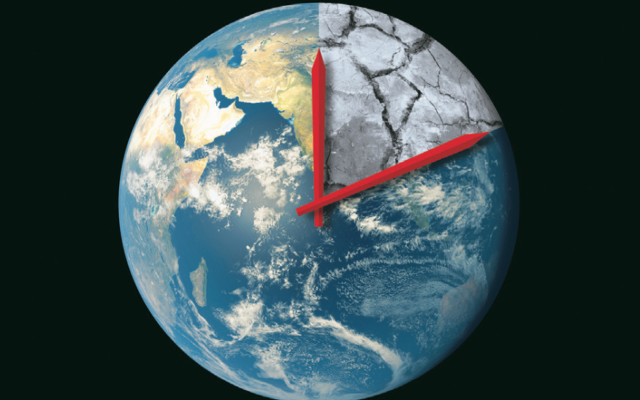Sign a birthday card to the world before it’s too late
Something simple, yet effective, you can do to help combat climate change.
Soon, we will all celebrate Rosh Hashanah in a strange, COVID- affected world. Shule and family meals may well be cancelled this year. Everything will be different.
And as we Zoom out from our daily struggle of COVID, towards one of the core themes of Rosh Hashanah, we find an astounding idea about the world at large: “Hayom harat olam – today the world is born.”
We read that God “remembers the making of the world … all of Creation and all things that were formed … a day decreed to remember every living thing”.
In addition to the personal, introspective quality of this period, Rosh Hashanah is expressly the “birthday of the world”, an opportune time to consider the state of the “numerous, endless creations” found in the Rosh Hashanah liturgy.
It is poignant that the “birthday of the world” this year falls so close to the release of the authoritative prognosis of creation itself – the Intergovernmental Panel on Climate Change (IPCC) 6th Assessment Report. Released on August 9, this report is historic. Seven years in the making, 3949 pages long, co-authored by 234 of the world’s top climate scientists, synthesising over 14,000 pieces of research, and relying on the latest technology, knowledge and modelling.
The report is overwhelmingly bleak. It finds that the earth’s climate has already warmed by 1.09 ̊C since pre-industrialisation, of which 1.07 ̊C is due to human activity. In Australia, land warming has reached 1.4 ̊C. For context, a 2 ̊C increase to the world’s temperature would make many parts of the planet incompatible with human life, and 1.5 ̊C would also lead to extremely dangerous consequences.
In crystal-clear terms the report states, “[It] is unequivocal that human influence has warmed the atmosphere, ocean and land. Widespread and rapid changes in the atmosphere, ocean, cryosphere and biosphere have occurred.”
Glen Mullins, former NSW Commissioner of Fire and Rescue, wrote in response, “The IPCC issued a stark warning: the steps we take from today to phase out coal, oil and gas – the biggest drivers of climate change … will deter- mine whether our children have a liveable future, or one that is incompatible with a functional human society.”
Breaching these temperature thresholds will lead to surges in catastrophic weather events such as bushfires, floods, cyclones, drought, crop failure, uninhabitable temperatures and sea-level rises. The impacts on urban areas and coastal cities such as Melbourne and Sydney will be especially felt. We see an example of these impacts in the unprecedented mega-fires raging across North America and the Mediterranean this past month.
Israel’s Environmental Protection Minister Tamar Zandberg said last week that the report demonstrated that Israel must declare global warming a “strategic threat” that warranted “greatly accelerating our pace of action and readiness”.
Admiral Chris Barrie, former chief of the Australian Defence Force, reflected that the impacts point to “escalating dan- ger for our local and regional security”.
Economists loudly warn that every day we wait, the costs of inaction further dwarf the costs of action. Not only in the spiralling costs of natural disaster dam- age (estimated by the World Resources Institute at $7.9 trillion by 2050), but in missing the unprecedented opportunities to capitalise on new industries, jobs, trade and exports in a zero emissions world.
In short, delayed action is as much environmental mismanagement as economic mismanagement.
What to do about it?
First, despite the harm already transpiring, every fraction of a degree of avoided warming matters and keeps us away from climatic “tipping points” from which we cannot return. Second, crucial solutions already exist. Leslie Hughes, distinguished professor of biology at Macquarie University, notes simply, “We know how to do it, and there are ample opportunities to do so.”
Our community is uniquely placed to help deploy solutions and engage key decision-makers to rapidly transition to a zero emissions world. The primary determinant of whether we succeed is government policy, and we’ve seen this clearly in almost unimaginable government responses to COVID. Through our businesses, political relationships and personal actions, we can do this. The potential is enormous and the impact multi-generational.
This historic situation reminds me of one of my favourite Talmudic stories: “One day, Honi was walking and saw a man who was going to plant a carob tree. Honi said to him: How many years until it will bear fruit? The man answered: 70 years. Honi asked: Is it clear that you will be alive in 70 years? The man answered: I found this world complete with carob trees that my ancestors planted. So too, I will plant some for my children.”
The actions we take now will be felt by us in this life and many times more by our children and grandchildren. There is no time to waste.
This Rosh Hashanah we have a chance to unite and share our voice, by signing the “Birthday Card to the World”. Every name matters!
Joel Lazar is CEO of the Jewish Climate Network. To sign the Birthday Card to the World, visit jcn.org.au/rosh_hashana_2021


comments